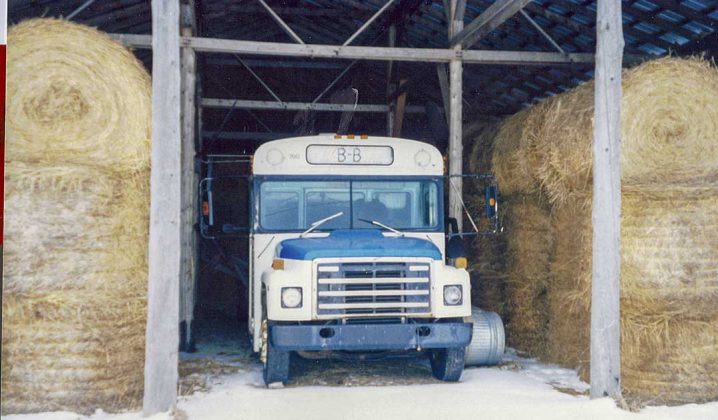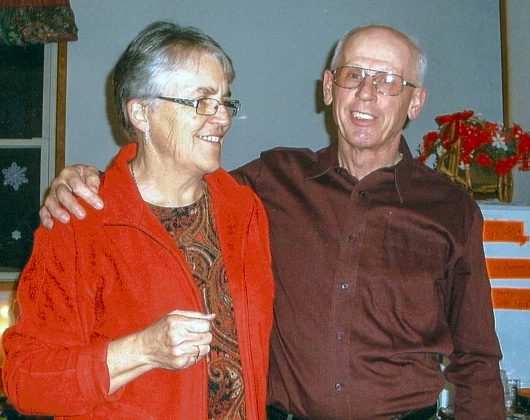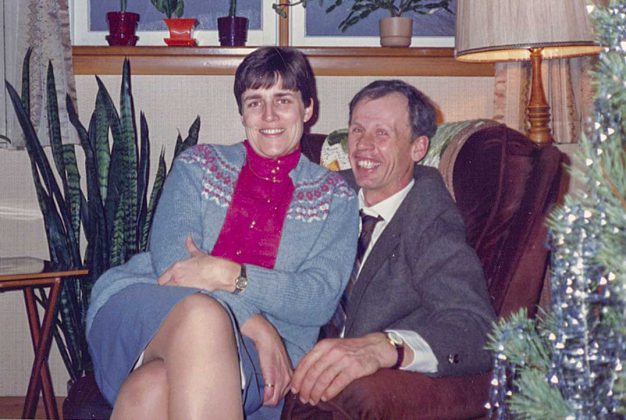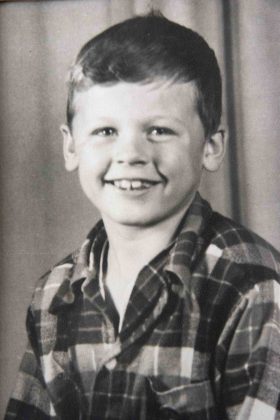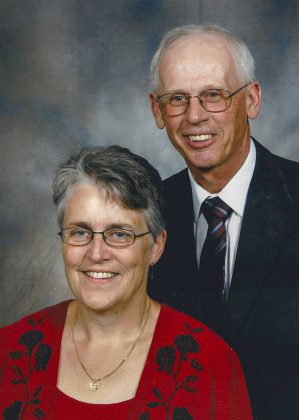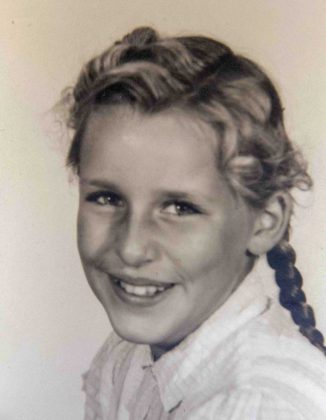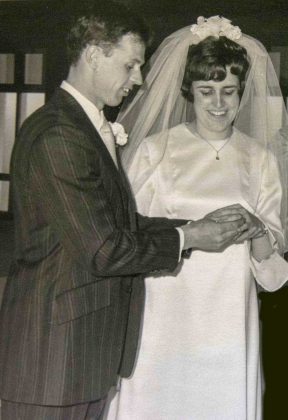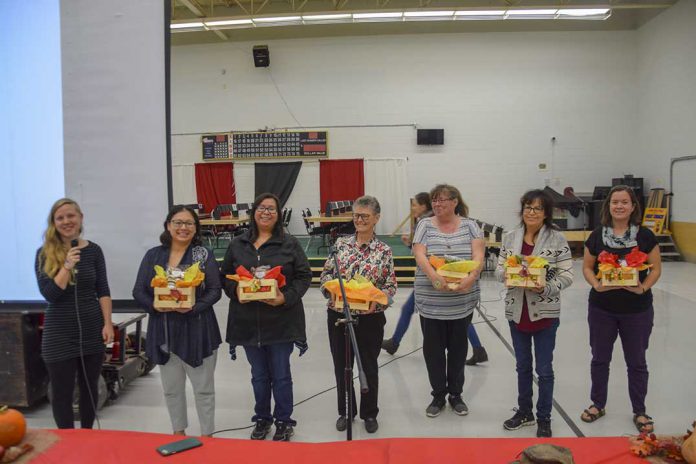Doug and Jane Wismer
Arriving at the Wismer’s well-appointed yard and comfortable home is a treat. All structures have been carefully planned to add order and harmony to a busy lifestyle. A huge workshop harbours a collection of historic implements and tools. Many practical skills were gleaned in Northern Ontario working for small contractors, ‘jobers,’ including the operation of heavy equipment, managing, delivering lumber, selling snowmobiles and many other tasks. And yet throughout his career, farming at home has always been his passion.
In the 1970s, Doug was the roads foreman for about six years and more recently, he became chief of the local Robinson Township Fire Department. Doug is still on the boards for the Silver Water Recreation Centre and the Silver Water United Church where his wife Jane has been treasurer for 30 years. He and Jane also look after the local cemetery. This task includes tracking where the grave markers go and doing compliance paperwork for the government.
Doug was born on January 15, 1947 to Orland and Bernice (nee Cockwill) Wismer. A great-aunt came to help with the birth. “It was a stormy day, so Dad had to put a lantern at the end of the driveway to help the doctor find the house.” By the time the physician arrived, Doug had been born. Doug would have one brother and four sisters: Lois, Eric, Lorna, Mavis and Kathryn.
Orland had been off to war and spent time in Holland, Belgium and Germany but was able to return to his family and his beloved 400-plus acre Fernlee Farm. Doug’s paternal Pennsylvania Dutch ancestors arrived at Markham in central Ontario from the USA in 1806. Doug’s great grandfather moved with his family to Gordon Township in 1879. His grandfather died when dad, Orland, was a small child. Doug adds, “I was also told that Morden, Manitoba was named after our paternal Morden family.”
In 1899, maternal grandfather Frank Cockwill came to Meldrum Bay from the Duck Islands where he had worked in a saw mill. Frank’s family had originated in England and moved to the Wiarton area. Grandfather had come for the timbering work in Meldrum Bay, but he was both a millwright and a blacksmith. His shop was located beside the present day Meldrum Bay Hotel.
“As a kid, I remember we lived very frugally. There were at least two droughts which meant no crops to feed a large family. Dad, however, could learn a job quickly. He worked consecutively at an acid plant on the North Shore and then as a pipefitter and at Dennison Mines in Elliot Lake and as a farmer when he found time to come home. The farm would be rented out while he was away. When I got older, I helped him and my step-grandfather McGibbon with the farm work. The work was more challenging then because there was no electricity. We used coal oil lamps and gas-driven water pumps.”
“One of my first recollections was going with dad in winter on our horse-pulled sleigh, heading for the woods at the back of the farm to cut pulpwood. I was about five and I froze. There was no sympathy from my father, so I had to wait until lunch to get warm. Winters were hard for most folk, including kids.”
“We had to tread through snow banks for two kilometers to get to SS#1 Robinson School. Sometimes, when it was very cold, school was cancelled to spare the little ones from frost. Two teachers taught a class of 55 kids from Grade 1 to Grade 10. The older boys liked to have snowball fights and once I got nailed with an icy missile on the side of the face. I was just six, but I reminded the regretful perpetrator of this travesty the day he married my aunt.”
“We played lots of games at school. Games like ‘Fox and the Goose’ The fox sat in the middle of a wheel of spokes drawn in the sand around him. He was only allowed to run on the spokes to catch his goose. Geese (the rest of us) ran around the spokes. If the fox caught you, then you became the fox. Baseball was popular, even though we had little equipment at school. You had to bring your own glove if you were lucky enough to have one.” ‘Red Rover, Red Rover’ had two lines of students holding hands tightly. Someone would be called over and that person would have to break through the line. If they were not successful, they joined the group that called them over.”
When his school work was done, and the teacher was occupied with other students, Doug would often grab a school library book. “I must have read every book in that library, and some books several times. The older students were also expected to help some of the younger kids read. That turned out to be beneficial for all of us.” In 1961, after Grade 8, Doug rode the school bus to the high school in Gore Bay. His favourite subjects were geography, science, French and English. He finished part of his Grade 13 before moving on to the University of Guelph.
Doug attended the Ontario Agricultural College for a two-year diploma in agriculture which included horticulture and agricultural mechanics, a type of basic engineering. The cost was only $300 for the year and that included all the books, tuition at $25 a year, plus room and board. “With the training you could qualify to be a farm equipment mechanic, do surveying, deal with explosives, weld and perform many other tasks.”
Doug met Jane Meyer at the Agricultural College on January 28, 1967. He knew right away that she was the one he would marry one day. “That’s the girl for me” he shared with friends. Jane had been born on November 25, 1946 in Holland and arrived at Hamilton with her parents and siblings at age five.
Doug first saw her at the arena where she was skating as part of the Inter-Varsity Christian Fellowship Group. The boys had come down to watch the girls. Doug walked her home afterwards and they began to date, enjoying long walks that ended with coffee and ice cream bars. Jane was taking household sciences: textiles, clothing and design. Her tuition was a hefty $700 a year.
Doug graduated in 1968 and began his working life while waiting for Jane to finish her degree in 1970. He started with Ankney and Franklin, a small northern contractor operating the rear-end piler for loading pulpwood. Most correspondence for the betrothed couple was long-distance. “We talked for 10 minutes on a pay phone once a week and we wrote to each other three times a week.” Doug would go north in November and return for Christmas by a CN train.
“I stayed in the upper level of the living quarters of a store beside Savant Lake, about 60 miles by train from Sioux Lookout. The whole community consisted of the store, a hotel and bar, the business I worked for, a train station and a few houses. On Saturday night, there would be several locals drinking at the bar. Occasionally, the greater variety of groceries available in Sioux Lookout lured folks onto the train to that town.”
The storekeeper had quite a business going. He bought furs for the Hudson’s Bay Company. He also had the liquor store, was the Justice of Peace and the Indian Agent. He sold trapping supplies as well as groceries. “One time he sold a single shot .22 to a Native trapper for $27 but forgot to write down the name of the buyer. When it came time to make out the bill, he decided that he would add the cost of the rifle to the bills of all 60 of his trappers, assuming he would get protests from those that had been incorrectly billed.”
“That was not the case. It seems his shy customers were too afraid to annoy the man who controlled so much of their lives. The shopkeeper in effect sold that rifle 60 times. He also rented out boats that had been left for storage but not claimed by their owners. It seems the storekeeper made a good profit, despite being in a remote area.”
On one cold February trip south by train, Doug was waiting for his train which turned out to be 24 hours late. When it finally came, the ticket was still valid but the train had arrived on a different day. “The conductor didn’t want me to get on. I finally convinced him to let me go, but it still took 48 hours to get to Toronto because there was a derailment and because of the bitter cold. The cold meant the train moved slowly because it couldn’t keep up enough heat. When I got to Toronto I had to take the bus to Guelph, leaving only three of my five days for the visit.”
The couple were wed on March 20, 1971 in Winona, near Hamilton, at the start of the university’s winter break. “Travelling down for the wedding, we had to deal with a terrible snow storm with visibility next to zero.” The nuptials had been timed to avoid calving in April, seeding in May, haying in July and also timed to get Jane to summer school in Thunder Bay for July. She needed to get her teacher’s certificate.
Silver Water neighbours Ken and Doreen Duncanson were married on the same day as the Wismers. “We attended their reception in Toronto and Ken attended our wedding. Our reception was at the Casablanca Motor Inn, a large facility near Grimsby on the Queen Elizabeth Way. The fire alarm went off accidentally, but nobody had to be evacuated.” The honeymoon took them to Sarnia and Sault Ste. Marie with a stop in Levack to pick exams up at the high school so the bride could mark them when she got back home.
Doug was working in Lively at Pinehill Lumber and Skidoo, doing deliveries and selling used snowmobiles until 1972. The couple lived in the back half of a house in Cartier by a train junction. “When we came for a visit to the Island, we shared Doug’s room in the farmhouse. In 1973, we built our own home on 25 acres of severed land. Charlie Middaugh and Cliff Orford of Evansville did the foundation and framing. We did the rest.”
“Initially, we had a portable toilet and no hot water among a forest of stud wall until we had time to finish the project. I did the wiring and Jane put in the insulation.” In 1991, the home was enhanced with a new living room addition and a new roof. “This addition gave us a place to visit with friends. It was vastly better than hiding in the bedroom to get away from the din of the younger generation.”
Over the years, the Wismers bought, sold and rented farmland to keep enough land nearby to maintain consistent production. “Our first computer was a Kaypro in 1983. It was the size of a small suitcase. It was essentially a word processor and Jane used it to organize her exams for students at Manitoulin Secondary School. I used it for farm work which required lots of planning. I calculated the performance of our cattle. When the calves dropped to 30 cents a pound one fall, we decided to keep them for a year when we were able to sell them for 60 cents a pound.”
“Our first new tractor had Jane worried. How would we pay for it? We did manage successfully. Over the years, we bought 14 tractors. At one point we were operating on 1,200 acres, much of it rented. We constructed buildings, such as pole barns, in several locations. We sold the farm three years ago. The original 1904 barn, built on bedrock, is still standing and being used.”
The Wismers have three sons, Christopher, James and Mark, all born in calving season, from March to May. “We raised the kids the best we could. We enjoyed their years with us and dealt with much of the same issues that other parents deal with. One son rolled the car but wasn’t hurt. Two of them were bitten by a dog, but not seriously. They didn’t play hockey because it was just too far to go to the games. I used to lull them to sleep with my version of bed-time stories. I would read the Farm News to them and it worked like a charm.”
“All of the boys helped on the farm as well as working at other jobs which helped them to pay for post secondary educations. When Christopher was about four, he learned a lesson the hard way. He wanted to help corral a cow that escaped from the yard. As his dad and Chris approached the cow, she ran right over Christopher, but he wasn’t hurt. He realized never to come between a cow and her escape route again. Chris also loved to help with the machinery.”
“When we did the shingling, dad and I were on roof and Christopher, age six, asked to operate the loader to get the shingles up to the roof. Apart from one little incident, the task was well completed, and Christopher was a big help. Later he paid his way through school by working on the farm.” Today, Christopher is a diesel mechanic who has a home near Massey with his wife Amanda. They have a son, Jade. Since diesel mechanics are relatively rare, Christopher has worked in a number of different locations in North and South America.
Son James lives in Ottawa where he works for a management company in the IT department, looking after the computers. His wife Michelle is a teacher for an alternative high school in Gatineau. They have a son Reid who is in Jr. Kindergarten this year.
Mark teaches at a private boarding high school on Vancouver Island. He is also a houseparent in one of the dorms. His wife Ulrika is a part-time nurse. They have four children, two girls and two boys. Cormac is nine, Stella six, Niall four and Beatrix two. Mark travelled to Australia with his family for a year as part of a teacher exchange program. “We visited them near Melbourne and we all toured Tasmania where inmates had built their own prisons. We also took the opportunity to visit New Zealand for a 12-day tour. We really enjoyed that.”
“In April 2003 our garage burned as a result of an electrical short. I wondered why the fuse hadn’t blown to stop the fire. I was just coming home from the farm when I saw the smoke. The longest five minutes was the time it took for the firemen to set up the pumper truck that had been called by our neighbour. More water was quickly obtained from nearby Cook’s Dock. The building was lost but our house was saved. It happened right at supper time and our neighbours were all available to help. Jane had been away in the morning but was home at the time of the fire, but she had not had any indication that a fire had started.”
“My favourite time of the year? It’s the fall. The crops are off, cows on pasture. It’s cool outside, the grass is not growing as fast, there are fewer bugs and no snow yet. Most of our travelling now is in the fall. When the kids were younger, it was summer family visits down south or trips looking for a new bull for the herd. Later, after the kids were on their own, we went a little further. In 2001 we drove to the east coast for 10 days, arriving back to Ontario on September 11, 2001. We wondered why there was so much excitement in the air until we learned about 9-11 happening. I saw the video but didn’t believe it was real at first.”
“Hobbies? I have been collecting old tools, including some from my grandfather, and displaying them in the big workshop here. My strengths? From the feedback I get, they are management and organizational work, designing and building things. We helped with the United Church construction. We did the framing, electrical, plumbing and drywall.”
Jane’s strengths are also organizational. “I establish and help manage the yearly Hunter’s Pancake breakfast, started by Peggy Noble, with proceeds going to the hospital.” Being a lay preacher, quilting and doing book-keeping, keeps her busy too. The fire chief appreciates her computer skills and the paperwork she does for them.
“Someone who inspired me?” Doug responds, “Oliver Runnalls is an excellent farmer and easy to talk to about farming” He adds, “Dad was a good farmer too. What do I still want to do? I don’t have a bucket list, but there is always lots to do. We hope to live a long healthy life. We have talked about going to Europe. We were there once, in 1970. on a charter flight for $127 each, round trip. A lot has changed since then.”
“Manitoulin is our home. I would sooner live here than anyplace else. Our yearly family reunion in Grimsby means crazy traffic from Barrie to Hamilton. That fast pace is not seen here on Manitoulin. A few years ago, we saw a small car in the ditch. It was a young couple and their cell phone didn’t work here. We pulled their car out with our tractor. Neighbours arrived, offering help. The stranger wanted to pay but we refused. He couldn’t understand why we didn’t expect money. It takes newcomers a while to adjust to that level of trust. Cities are all the same, part of the rat race. Here, people are friendly, outgoing and helpful. Home is where our hearts are. Our hearts are here.”
Favourite saying: “Be satisfied with what you have and do the best you can with what you have.”


